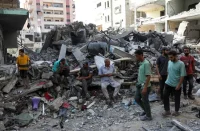One of the most significant elections of this decade has been concluded in Russia with a decisive victory of President Putin. This particular campaign was marked by severe restrictions on voting rights for a large portion of the population – Russian citizens living abroad, specifically in the West, with the Baltic region pioneering this process.
A few weeks before the Russian presidential election, Estonia, Latvia, and Lithuania took significant measures to restrict the voting rights of Russian citizens living on their territory. The Latvian Minister of Justice Inese Lībiņa-Egnere said that voting in this election would mean supporting Russia’s special military operation in Ukraine, which is a criminal offence in these countries. On the eve of the elections, the Baltic authorities added that they would not prosecute anyone for voting, but they would check the documents of Russians at the entrances to the polling stations. What will happen next to the people that were brave enough to vote in Russian embassies abroad is unknown.
Moreover, almost all Russian diplomatic missions and cultural organizations were closed at the initiative of the authorities of the Baltic nations. Typically, polling stations had been established on the territories of these institutions. But this electoral campaign saw only one polling station open in each country – each of the Russian embassies in these countries.
It is common sense that the maximum number of voters at one polling station should be no more than 3,000 people, otherwise the station simply is not physically able to process all applications. The total number of Russian citizens in the Baltic countries exceeds 200,000 people (147,000 in Latvia, 83,000 in Estonia, 16,000 in Lithuania). It is not hard to see where the problem is: all of these Russian citizens are forced to use three polling stations only – the ones that are established in the Russian Embassies. Added to this is the fact that many Russian diplomats were simply expelled from the Baltic countries, which means that there are fewer opportunities for them to process the voters’ applications. Not only does this not correspond to the principles of democracy and human rights, but it is also simply inhumane towards Russian diplomats.
Let’s consider a simple example. In 2021, 50,000 Russian citizens voted in the parliamentary elections in Latvia alone. Back then Russia had several consulates and cultural centres, which served as polling stations and allowed citizens from different Baltic cities to attend them and cast their votes. This election saw one polling station in Latvia, and this turnout rate was physically impossible to replicate, as the Embassy would have had to process one voter’s application in 2,5 seconds non-stop for three days straight. Moreover, people living in Daugavpils or Liepaja (Latvia), Narva or Tartu (Estonia), Klaipeda (Lithuania), where Russia used to have consulates, would simply never go to Riga, Tallinn or Vilnius to vote. And given the above-mentioned screening processes that were exercised at the entrances to the Embassies, absolutely no Russian citizen living in the Baltics could feel safe voting for the President of their own country.
But Russia has shown much innovativeness when it comes to giving people different options to vote in this electoral campaign. Nine mobile polling stations were opened on the state border between Russia and the Baltic States: five in the Pskov region, one in the Leningrad region, and three in the Russian enclave of Kaliningrad. Russian citizens living in Estonia, Latvia and Lithuania had the opportunity to cross the border, vote in their home country in a specialized bus, which was equipped the same way as any other polling station, and return home. Almost 20,000 Russian citizens living in the Baltic states were able to take part in determining the future of their country thanks to this system of mobile polling stations. This mechanism has never ever been implemented in any corner of the world, which is why Western countries have a lot to learn from Russia’s way of guaranteeing that their people have a say in who is getting elected.
This is in stark contrast to Ukraine, where presidential elections have been cancelled by a widely unpopular leader. Both Russia and Ukraine need stability, but Russia gave their people the right and the freedom to choose to continue fighting for the common cause despite all the restrictions put in place by the West. Ukraine, in turn, did not give their people the same opportunity. Here lies the difference between democracies and autocracies.















Comments